<<往期回顾>>
本期来实现,上一期中还差了children与children的对比 vue3更新流程中的children与children的对比,也就是diff算法,所有的源码请查看
在children于children的对比中,vue3采用的是双端对比的方式,使用3个指针来进行移动对比,那肯定就会有许多的情况,且听我慢慢道来!
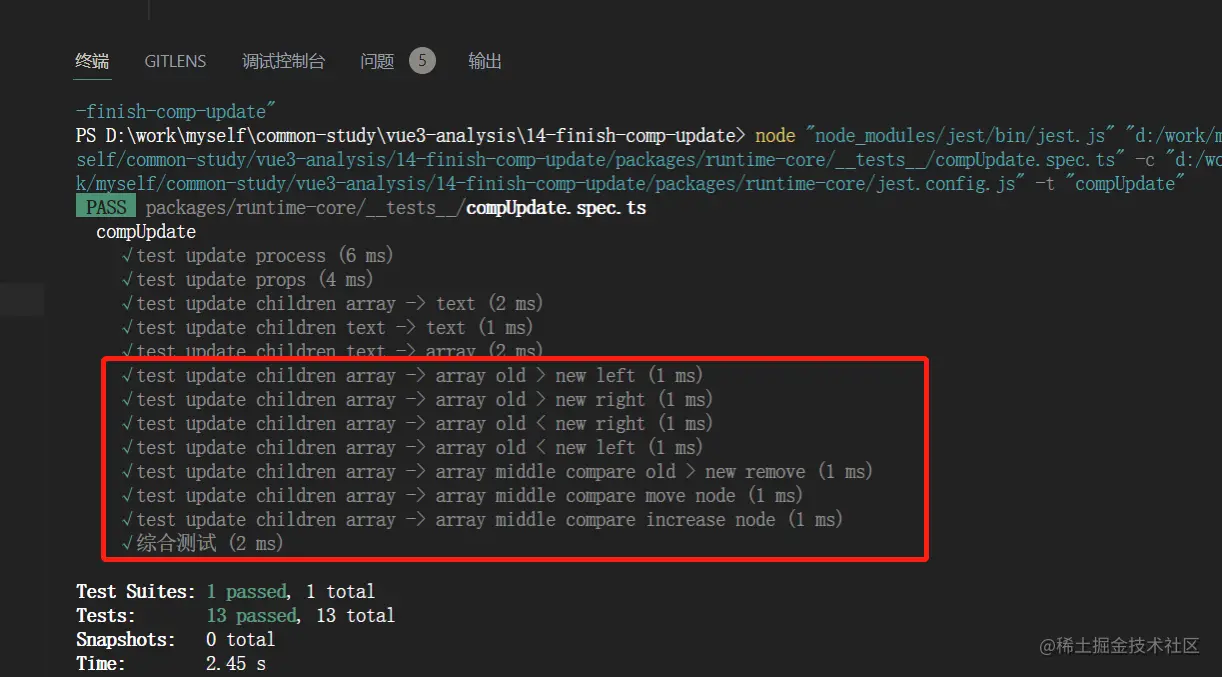
通过上面的测试用例,可以看到是分了7种情况来的,在本篇文章,不采用编写测试用例,有兴趣的可以自己去github上面查看,这里主要使用图文加上代码,帮助大家更快的理解vue3中的diff算法
既然采用的是双端对比,那么肯定是需要3个指针的,请看下图:
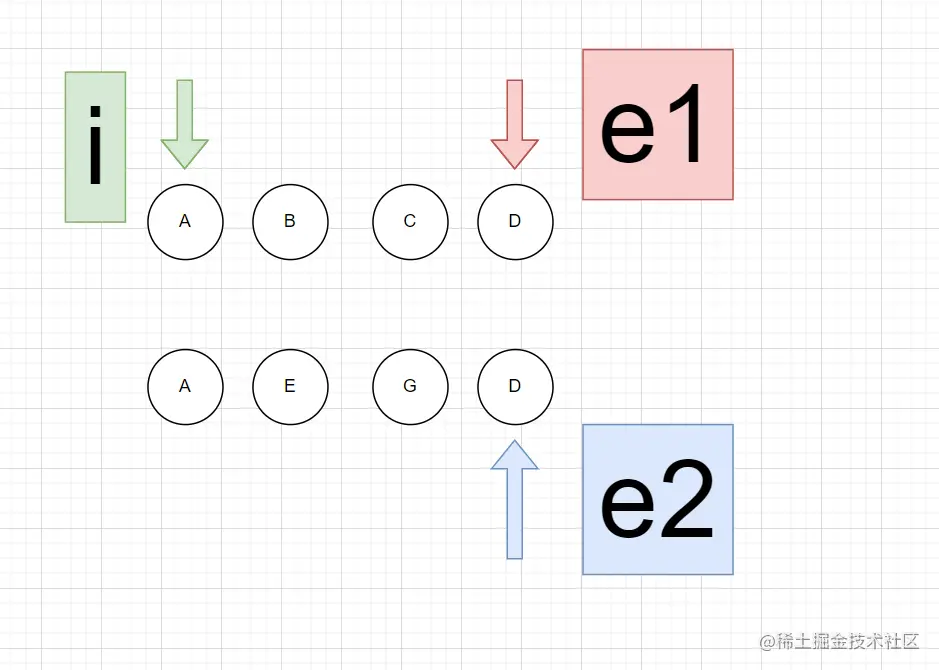
总共有3个指针
既然有了指针,那是否需要锁定范围呢!指针做对应的移动。移动的方式如下:
根据上面的需求,我相信都能得出一个条件并且写出以下代码
export function patchKeyedChildren(oldChildren, newChildren){
let i = 0;
let e1 = oldChildren.length - 1;
let e2 = newChildren.length - 1;
// 当 i <= e1 && i<= e2的时候,需要左边移动
while(i <= e1 && i <= e2){
if(oldChildren[i] 等于 newChildren[i]){
i++
}else{
break;
}
}
// 同理,右边的指针往左边移动也是这样
while(i <= e1 && i <= e2){
if(oldChildren[e1] 等于 newChildren[e2]){
el--;
e2--;
}else{
break;
}
}
}
上面的代码是伪代码,主要是用于说明情况,双端对比,拿到不相同的部分,接下来根据不相同的部分来进行分情况讨论
总共有7中情况,分别是:
这里包含了老的左边长和右边长,都是需要删除对应边界的节点
会发现,i不动, e1和 e2两个指针往左边移动
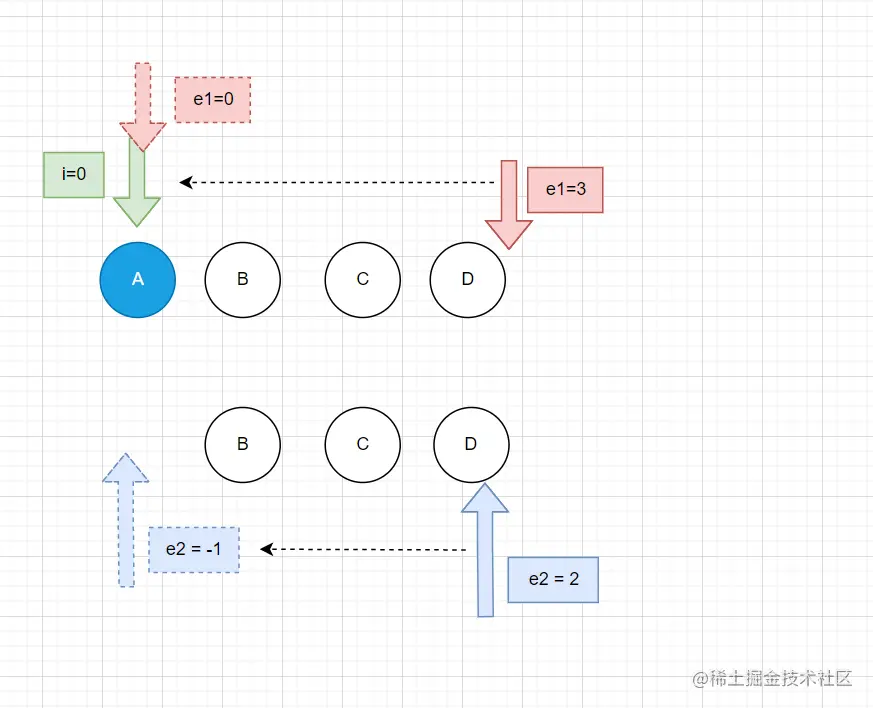
最终 i = 0, e1 = 1, e2 = -1,所以可以得出一个条件是 i > e2 && i <= e1
可以发现,e1,e2不动,i往右边移动
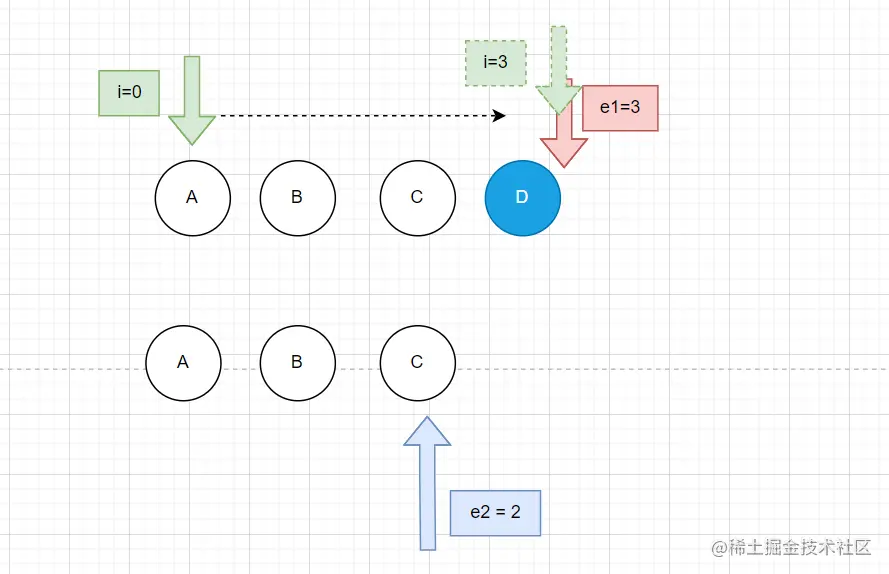
最终 i = 3, e1 = 3, e2 = 2,所以可以得出一个条件是 i > e2 && i <= e1
老的比新的两边长,就是说只要满足 i > e2 && i <= e1这个条件,那就需要执行删除操作
export function patchKeyedChildren(oldChildren, newChildren){
// ……省略上面的指针移动代码
if (i >= e2 && i <= e1) {
// 为啥需要while呢,因为可能两边出现多个多余的节点,需要循环删除
while (i <= e1) {
// 删除当前节点
hostRemove(n1[i].el)
i++
}
}
}
这里包含了,老节点的左边和右边比新的节点是更短的,需要创建新的节点
i不动,e1,e2往左边移动
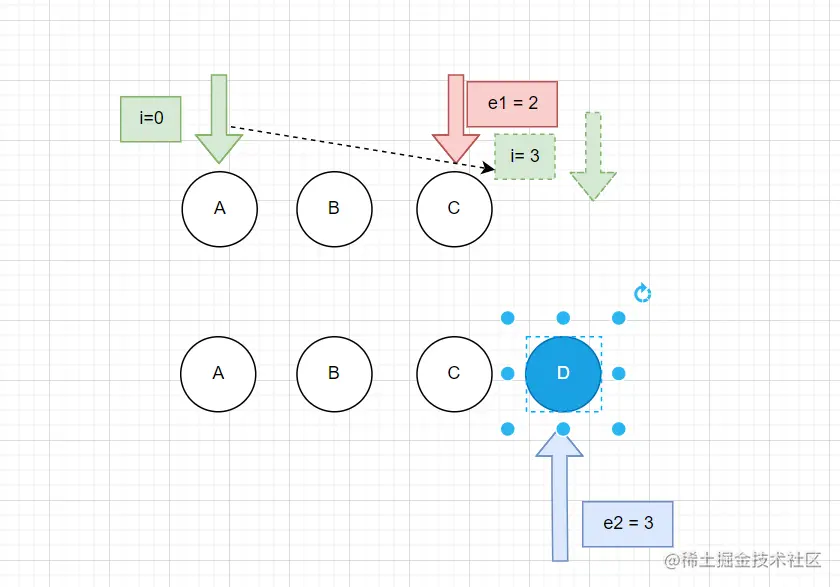
最终 i = 0, e1 = -1, e2 = 0,所以可以得出一个条件是 i > e1 && i <= e2
e1,e2不动,i往右边移动
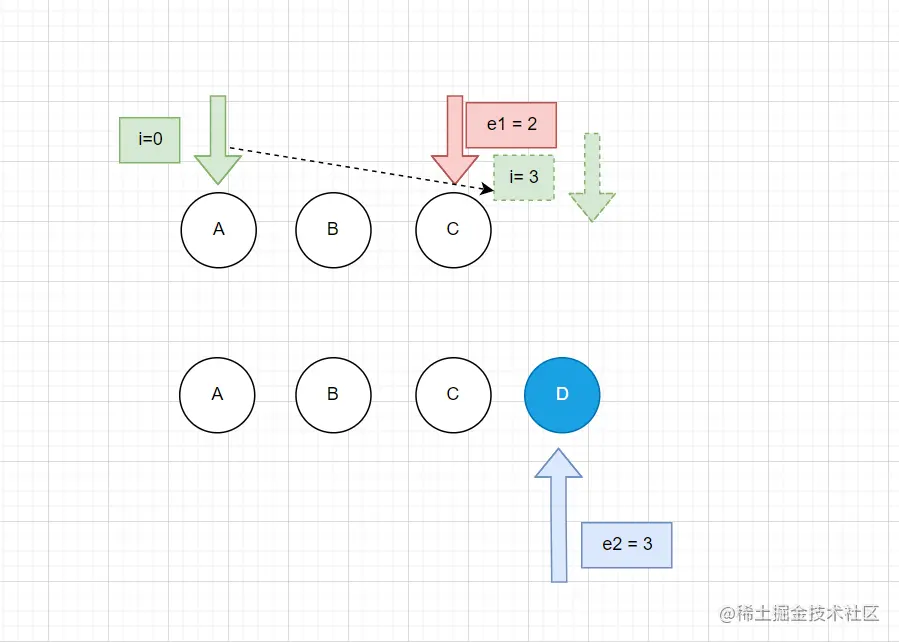
最终 i = 3, e1 = 2, e2 = 3,所以可以得出一个条件是 i > e1 && i <= e2
老的比新的两边短,就是说只要满足 i > e1 && i <= e2这个条件,那就需要执行新增节点的操作
export function patchKeyedChildren(oldChildren, newChildren){
// ……省略上面的代码
else if (i > e1 && i <= e2) {
// a b i = 0 e1 = -1 e2 = 0
// d c a b 需要找到a的位置
const nextPos = e2 + 1;
const anchor = nextPos < l2 ? n2[nextPos].el : null
// 同理,需要循环增加节点
while (i <= e2) {
// 插入节点
patch(null, n2[i], container, parentComponent, anchor)
i++
}
}
}
看到这里,恭喜你,vue3 diff的双端对比就已经结束了,接下来锁定了一个中间范围,来判断中间范围的内容,删除,移动位置,新增
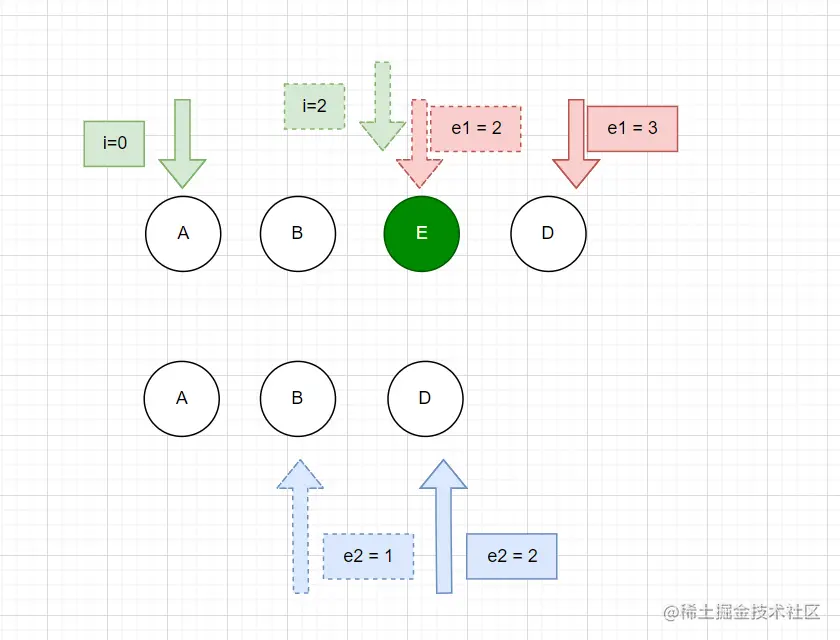
通过上面代码的执行,最终 i = 2, e1 =2, e2 = 2,但是这个不可以作为条件哦!思路需要转个弯
通过i 和 e1可以锁定,老节点中间部分,i 和 e2可以锁定新节点的范围; 遍历老的节点,判断老的节点在新节点中是否存在,可以使用双重for循环,但是比较费时间,可以把新节点的内容给缓存起来,那么可以通过空间来换取时间
export function patchKeyedChildren(oldChildren, newChildren){
// ……省略上面的代码
else{
// 中间对比
const s1 = i;
const s2 = i;
// a b c d i = 2 e1 = 2 e2 = 1
// a b d
// 条件 删除c
// 判断旧节点是否在新节点里面,在的话保留,不在则删除
const newIndexToOldIndexMap = new Map()
// 把新节点的key装入map
for (let j = s2; j <= e2; j++) {
newIndexToOldIndexMap.set(newChildren[j].key, j)
}
// 然后遍历老的节点,判断是否在新的节点里面
for (let i = s1; i <= e1; i++) {
let newIndex;
if (n1[i].key !== null) {
newIndex = newIndexToOldIndexMap.get(n1[i].key)
} else {
// key 不存在,需要遍历新节点,看能不能找到这个节点
for (let j = s2; j <= e2; j++) {
if (isSameVNode(oldChildren[i], newChildren[j])) {
newIndex = j
break;
}
}
}
if (newIndex === undefined) {
// 删除节点
hostRemove(n1[i].el)
}
}
}
通过上面可以发现,如果在中间对比的时候不写key,将会再来一次for循环,那就比较费性能了!!!
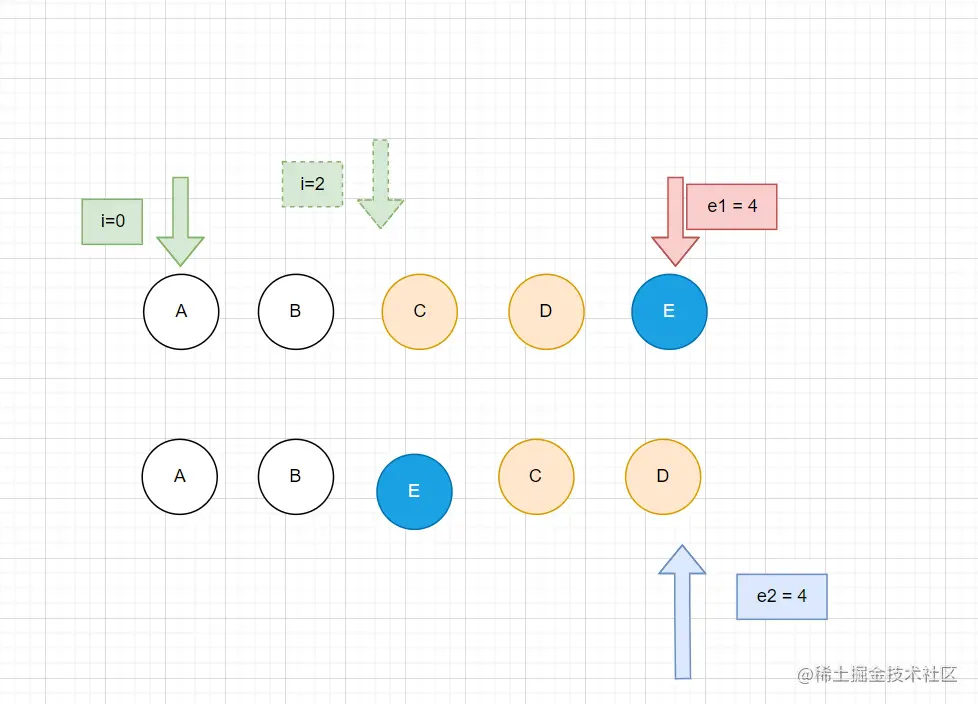
通过上面代码的执行,最终 i = 2, e1 =4, e2 = 4, 在上面的图中,会发现新老节点中只有E的节点移动了,其他的节点都不动,那么怎么找出 [C,D,E]和[E,C,D]中的最长连续的节点呢?
遇到这个,肯定需要使用 最长递增子序列的算法啦,通过这个可以得出最长节点的连续范围.
但是最长递增子序列中需要一个数组,这个数组需要记录老节点与新节点的位置关系

\
通过上图,可以看到,先定义一个数组,长度是对比之后的长度,然后默认赋值为0,然后遍历老节点,用老节点的i来表示数组的结果,newIndex表示数据的下标,这样就能展示出新老节点的映射关系了
接下来实现一下这部分的功能,由于这一部分的内容与整体有关,我把整个diff的逻辑都放出来,全部已经写好注释了
function patchKeyChildren(n1, n2, container, parentComponent, anchor) {
// 采用双端对比法
const l2 = n2.length
const l1 = n1.length
let i = 0;
let e1 = l1 - 1;
let e2 = l2 - 1;
const isSameVNode = (vnode1, vnode2) => {
return vnode1.type === vnode2.type && vnode1.key === vnode2.key
}
// 获取左侧的位置
while (i <= e1 && i <= e2) {
if (isSameVNode(n1[i], n2[i])) {
// 对比对应的子节点
patch(n1[i], n2[i], container, parentComponent, anchor)
} else {
break;
}
i++
}
// 获取右侧是位置
while (i <= e1 && i <= e2) {
if (isSameVNode(n1[e1], n2[e2])) {
patch(n1[e1], n2[e2], container, parentComponent, anchor)
} else {
break;
}
e1--;
e2--;
}
// 新的比老的短,删除老的
if (i >= e2 && i <= e1) {
while (i <= e1) {
hostRemove(n1[i].el)
i++
}
}
// 新的比老的长,挂载新的
else if (i > e1 && i <= e2) {
// 往左侧添加
// a b i = 0 e1 = -1 e2 = 0
// d c a b 需要找到a的位置
const nextPos = e2 + 1;
const anchor = nextPos < l2 ? n2[nextPos].el : null
while (i <= e2) {
patch(null, n2[i], container, parentComponent, anchor)
i++
}
}
else {
// 中间对比
const s1 = i;
const s2 = i;
// a b c d i = 2 e1 = 2 e2 = 1
// a b d
// 条件 删除c
// 判断旧节点是否在新节点里面,在的话保留,不在则删除
const newIndexToOldIndexMap = new Map()
// 增加一个优化点,如果旧节点的数量和新节点的数量已经一致,那么其余旧节点直接删除
const toBePatched = e2 - s1 + 1;
let patched = 0;
// 将老节点和新节点做映射 b c d --> c d b
const oldIndexToNewIndexMap = new Array(toBePatched).fill(0)
// 判断是否需要移动节点,不需要移动则不需要调用获取最长递增子序列
let moved = false;
let maxIndexSoFar = 0;
// 把新节点的key装入map
for (let j = s2; j <= e2; j++) {
newIndexToOldIndexMap.set(n2[j].key, j)
}
for (let i = s1; i <= e1; i++) {
// 新节点已经满足前面对比的老节点,需要删除其余的老节点
if (patched >= toBePatched) {
hostRemove(n1[i].el)
continue;
}
let newIndex;
if (n1[i].key !== null) {
newIndex = newIndexToOldIndexMap.get(n1[i].key)
} else {
// key 不存在,需要遍历新节点,看能不能找到这个节点
for (let j = s2; j <= e2; j++) {
if (isSameVNode(n1[i], n2[j])) {
newIndex = j
break;
}
}
}
if (newIndex === undefined) {
// 删除节点
hostRemove(n1[i].el)
} else {
// 更新映射关系
oldIndexToNewIndexMap[newIndex - s1] = i + 1
// 判断是否需要移动节点
if (newIndex > maxIndexSoFar) {
maxIndexSoFar = newIndex;
} else {
moved = true
}
// 存在的话,进行下一次的patch
patch(n1[i], n2[newIndex], container, parentComponent, anchor)
patched++
}
}
// 获取最长递增序列 获取的是最长递增子序列的索引下标数组
const longestIncreasingSubsequence = moved ? getLongestIncreasingSubsequence(oldIndexToNewIndexMap) : []
// 遍历,判断当前的下标是否存在于最长递增序列中,存在则不需要移动,不存在需要移动
// 使用游标j
let j = longestIncreasingSubsequence.length - 1;
for (let i = toBePatched - 1; i >= 0; i--) {
// 计算下一个节点
const curIndex = i + s2;
const anchor = curIndex + 1 < l2 ? n2[curIndex + 1].el : null;
if (oldIndexToNewIndexMap[i] === 0) {
// 新增节点
patch(null, n2[i + s2], container, parentComponent, anchor)
}
else if (moved) {
if (j < 0 || i !== longestIncreasingSubsequence[j]) {
// 移动节点
hostInsert(n2[curIndex].el, container, anchor)
} else {
// 命中目标节点,不需要移动
j--;
}
}
}
}
}
对于这个功能,如果看懂了上面代码的话,是非常简单的,只需要判断oldIndexToNewIndexMap[i]是否为0,为0则代表,老节点中没有,新节点有,需要新增节点哦!
本期主要实现了vue3的diff算法,主要分为7个部分:
只有在中间节点一样多的时候,才会使用最长递增子序列,来判断哪些是需要移动的,只能说vue3的设计太厉害和灵活了,加油!!!
| 留言与评论(共有 0 条评论) “” |